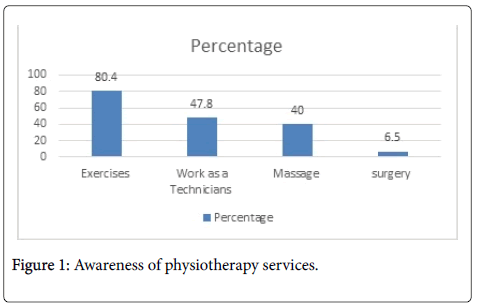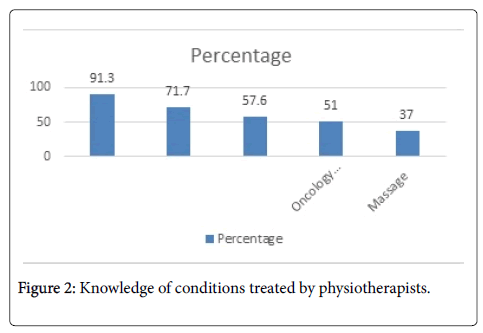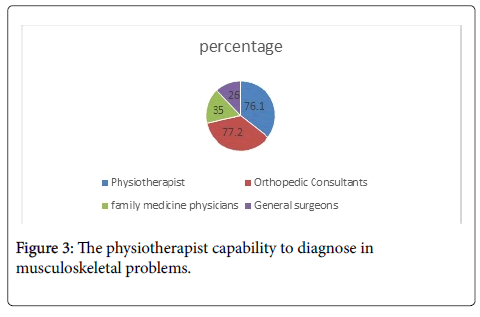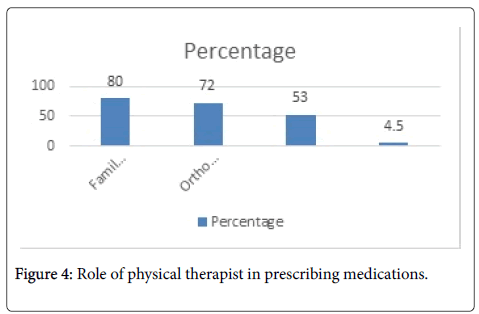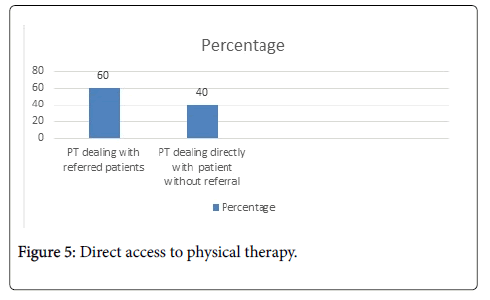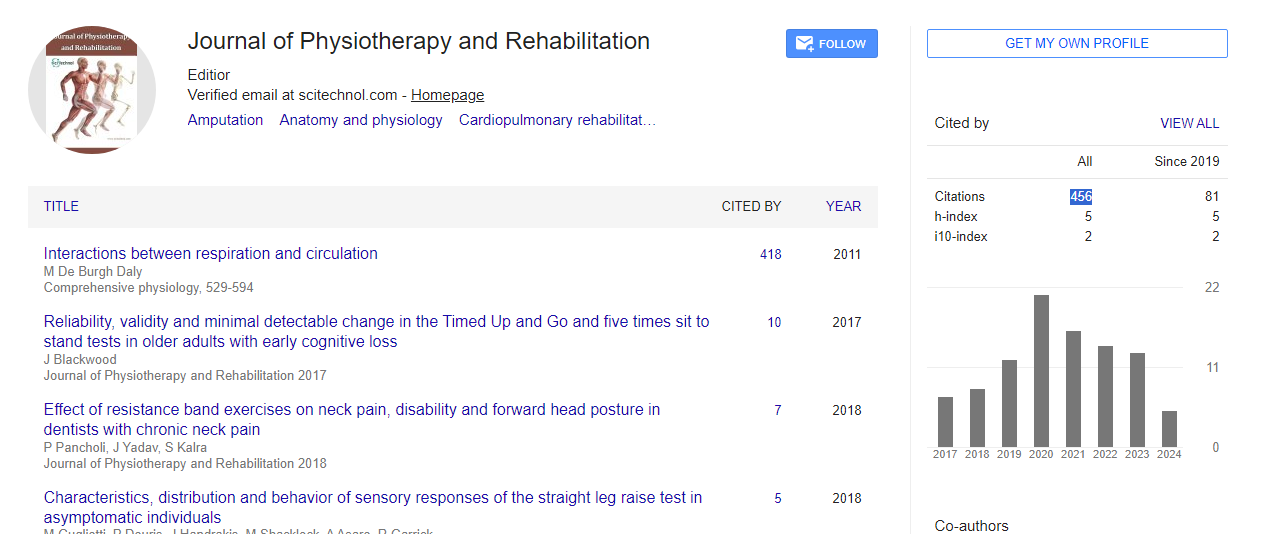Research Article, J Physiother Rehabil Vol: 2 Issue: 2
Awareness and Knowledge of Physical Therapy among Saudi Arabia Adult Population
Jaleel Mohammed1,2*, Muhannad Alhamidah3, Reem Alammar4, Mohammed Jawkhab3 and Lujain Bukhari1
1Department of Physical Therapy and Rehabilitation, King Faisal Specialist Hospital and Research Center, Riyadh, KSA
2Physical Therapy Association for Graft Versus Host Disease, Swindon, UK
3Majmah University, Majmah, Saudi Arabia
4Physical Therapy Department, Al-Habib Hospital, Riyadh, KSA
*Corresponding Author : Jaleel Mohammed
Department of Physical Therapy and Rehabilitation, King Faisal Specialist Hospital and Research Center, Riyadh, KSA
Tel: +966505433711
E-mail: qualityfrlife@gmail.com
Received: October 11, 2018 Accepted: December 21, 2018 Published: December 28, 2018
Citation: Mohammed J, Alhamidah M, Alammar R, Jawkhab M, Bukhari L (2018) Awareness and Knowledge of Physical Therapy among Saudi Arabia Adult Population. J Physiother Rehabil 2:2. doi: 10.4172/jptr.1000114
Abstract
Objective: The aim of this study is to ascertain the awareness and knowledge of physiotherapy among the general public in the Kingdom of Saudi Arabia.
Methodology: A cross-sectional survey using a self-administered questionnaire was constructed by the authors. The study was conducted between June and August 2018 where the questionnaire was planted online and invitation to participate in the study along with an explanation of its importance, and a link to the questionnaire was sent to individuals via various social media platforms.
Results: A total of 964 participants comprising 77% female and 23% women participated in the study. They were aged between 18-45 and majority of the participants were Saudi nationals (94%) while 5% were expats. Overall majority of the participants lacked knowledge the other aspects of physical therapy (PT) services available to patients other than the musculoskeletal problems. The current study highlights not only the lack of public awareness about PT as a professional and its scope of practice in KSA, but it also provides a food for thought on the future development of the professional development in the kingdom.
Conclusion: Lack of awareness and knowledge regarding PT services may hamper the effective and timely referral of patients and there is an urgent need for the health care policy makers and institutions to promote education about the various aspects of PT so that there can be a proactive healthcare facility in line with the government’s 2030 vision of making healthcare efficient.
Keywords: Physical therapy; Saudi Arabia; Public perception; Knowledge; Awareness
Introduction
Physiotherapy (PT) is an internationally recognized health profession which is practiced by qualified and, where required by state or national legislation, duly registered or licensed physiotherapists [1]. It is a dynamic profession which uses a range of treatment techniques to restore movement and function within the body [2]. PT’s promote the health and wellbeing of individuals and aid in preventing musculoskeletal impairments, functional limitations, and disabilities in individuals at risk of altered movement behaviors due to health or medically related factors, socio-economic stressors and lifestyle factors [3]. PT as a profession has evolved and grown to be able to offer specialized services in various healthcare setting such as: neuromuscular, musculoskeletal, pediatric, women’s health, orthopedic, geriatrics, lymphedema, oncology, cardiovascular and respiratory problems [1].
PT’s also form a part of the multidisciplinary healthcare team playing an essential role in reducing patient hospital stay by aiding patient recovery [4]. However, various studies have highlighted that the lack of knowledge about PT and its scope of practice among many public and medical professionals is still a issue in this 21st century [1]. Although PT has been a vital player within the healthcare industry in the Kingdom of Saudi Arabia (KSA), similar patterns of lack of awareness and understanding of scope of practice of PT within the medical and the non-medical population is being reported. One of the ways by which this problem can be tackled is by identifying the extent of the problem by research and reporting it to the healthcare bodies responsible for working towards awareness and education about the PT as a profession to the general population. The aim of this study is to ascertain the awareness and knowledge of physiotherapy among the general public in KSA. The specific objectives of the study were to determine: knowledge of where physiotherapy service can be received, knowledge of conditions treated by physiotherapists, knowledge of treatment modalities used in physiotherapy and how respondents make use of their knowledge of physiotherapy.
Background
Physiotherapy (PT) received distinction and recognition as a profession in the UK in early 1894 giving birth to the chartered society of physiotherapy (CSP) association [5], while in the United States the PT association was founded in 1921 [6]. In 1951 the CSP became the one of the founding members of the World Confederation of Physical Therapy (WCPT) and by 1978 physiotherapists could treat patients without prior medical referral thus becoming independent practitioners yet a UK study in 2005 found that one in six individuals knew very little about PT profession [7]. Similarly, 2011 study in US found lack of knowledge about PT being a multi-factorial profession [8]. In Saudi Arabia (KSA) started offering PT professional training around 1977, at a much later time when compared to the rest of the world [9]. The PT profession being novel in this region of the world, lack of awareness among the physicians, nursing staff and healthcare leaders about the scope of PT practice is still a major issue [10]. While the level of awareness among the healthcare professionals is low, it could be assumed that the overall general population would also have much lower awareness about the profession and its scope of practice. Anecdotal reports from various PT professionals in KSA have suggested that the problem is not only the lack of awareness about the PT profession but also that majority of the patients perceive PT to be masseuse or exercise trainers who act on the instructions of doctors or consultants. Such perception in the 21st century needs addressing especially considering PT as a profession has grown leaps and bounds in many countries, where patients are now able to self-refer for PT without needing a referral from a physician, able to prescribe drugs for patients [11], prescribe and administer corticosteroid injections[12] and finally certain NHS trusts in the UK are training PT’s to be orthopedic surgical assistants [13].
To the best of our knowledge, no study has previously investigated the awareness of general population about the PT profession in the KSA. Hence, the current study will explore the awareness, perception and beliefs about PT among the adult population in the KSA. The results of this study can help pave way to identify the gaps and plan an appropriate action to help raise awareness among the general population.
Materials and Methods
A cross-sectional survey using a self-administered questionnaire was constructed by the authors. A draft version of the questionnaire was given to a sample of eleven non-participating individuals to review it as a pilot and their comments were used to refine the final version of the questionnaires. The study was conducted between June and August 2018 where the questionnaire was planted online and invitation to participate in the study along with an explanation of its importance, and a link to the questionnaire was sent to individuals via various social media platforms. The participants were asked to complete the questionnaire before end of August 2018 and their response was considered as consent to participate in the study. The questionnaire form consists of 3 sets of 12 questions as per the following. Section one: consists of age, gender, nationality, and education level, section two: consists of questions based on conditions treated in physical therapy, and the benefit of physical therapy intervention. Section three: includes the questions based on awareness of physical therapy and the role of physical therapy.
Ethics
The work was commenced only once the King Faisal Specialist Hospital and Research Center ethics committee gave ethical clearance.
Inclusion criteria
18 years old and older, ability to read Arabic or English and understand the contents of the survey questionnaire, and resident of Saudi Arabia.
Exclusion criteria
Saudi national residing outside the KSA.
Description of the instrument
Data was collected with a survey questionnaire which comprised 12 closed ended questions divided into three sections. Section A contained question on the demographic characteristics of the respondents. Section B and C contained items which evaluated awareness and knowledge of physiotherapy among the public. The questionnaire was pilot-tested on eleven non-participating individuals. The questionnaire was planted online and invitation to participate in the study along with an explanation of its importance, and a link to the questionnaire was sent to individuals via various social media platforms.
Results
Demographic characteristics of respondents
A total of 964 participants comprising 76.7% female and 23.3% women participated in the study. They were aged between 18-45, 94.51% Saudi nationality while 5.49% non-Saudi, and the education level was found as under graduate 40% and post graduate 54% (Table 1).
| Gender/ Nationality/Age | Male | Female | Saudi | Non-Saudi | 20-24 | 25-34 | 35-44 | 45+ |
|---|---|---|---|---|---|---|---|---|
| N | 225 | 739 | 911 | 53 | 424 | 360 | 95 | 85 |
| % | 23.3 | 76.6 | 94.5 | 5.5 | 44 | 37.3 | 9.9 | 8.8 |
Table 1: Demographic characteristics of the respondents (N=964).
Awareness of physiotherapy services
Although 80% of the participant reported having previous knowledge of PT services as a treatment via exercises, 48% of the participants defined PT role as technicians, 40% mentioned that PT as being more of massage therapists, while a small number of participants (n=6%) believed that PT undertake surgery (Figure 1).
Knowledge of conditions treated by physiotherapists
Participants were asked about their knowledge of various conditions treated by PT’s and the majority of the participants were convinced that PT’s treat sports and orthopedic conditions (n=91%), while 72% also included PT’s in women’s health, 58% for the disorders of the cardiovascular system, 51% for treating oncology and organ transplant and lastly only 37% believed that the PT’s work as masseuse (Figure 2).
The participants received physical therapy and its impact
When asked whether they received physical therapy in the past 48% responded yes and 52% responded no and on average the percentage of improvement after the PT intervention was scored as 55%.
The physiotherapist capability to diagnose in musculoskeletal problems
The physical therapists were scored almost equal to orthopedic consultants, when it comes to diagnosis of musculoskeletal related conditions 76% and 77% respectively, which is a very positive outcome for the profession, while the family medicine doctors were scored at 35% and 26% for the general surgeons (Figure 3).
Role of physical therapist in prescribing medications
This question was added to check if the patients would trust physiotherapists in prescribing medications. Majority of the respondents (n=80%) stated that family physicians toped the chart with regards to professionals that can prescribe medications, while orthopedic consultants 72%, general surgeons 53% and a small number of participants believed that the physical therapists are also capable of prescription of medications (Figure 4).
Direct access to physical therapy
There was a minor to moderate split between the participants for and against the physiotherapists being front line assessors, dealing with patient directly without doctor’s referral for assessment and management, 60% and 40% respectively. However, on the other hand we also found 29% of the participants had reportedly accessed physical therapy services without being referred from physician (Figure 5).
Discussion
This study was undertaken to assess the level of awareness and knowledge of physical therapy services among the general public in KSA. A large number of respondents in this study had previous knowledge of PT, and knew that physiotherapists employ exercises as a main and frequently used modality for treatment. Sometimes, when the PT’s receive referrals to treat patients, they often introduce themselves, as people who give treatment by exercises. Statements such as “I am here to teach you exercise” is used. Hence, they might have earned the tag of exercise professionals. The fact that exercise is associated with the PT profession had been reported earlier in a study by Higgs, et al. [14] who reports exercise as the backbone of PT practice.
A considerable number of participants reported perceiving PT’s as technicians or massage therapists. This notion of PT’s being massage therapist might have come from various previous literatures. For example, French et al. [15] described PT as a manual therapy, or manipulative therapy which is utilized by PT’s to manage musculoskeletal pain and disability; and some of its techniques being kneading and manipulation of muscles, joint mobilization and joint manipulation. Anecdotal evidence suggests that the techniques of manual therapy or manipulation are being reported by the patients as massage thus disseminating the idea “I had massage”.
In this study, most respondents expressed the view that physiotherapists treat disorders of sports injuries and orthopedic cases as number one followed by women’s health, cardiovascular problems, oncology and organ transplant. This could be attributed to the large number of the referrals from orthopedic units compared to other clinics. Invariably, some of the hospitals in the KSA might have limited physical therapy services to MSK cases where the role of a PT is inevitable and most highly appreciated. Therefore, one can argue that the majority of the general population views PT services along the lines of mobilization of stiff joints and strengthening of weak muscles. Hence, it is not surprising that the majority of the participants would lack awareness on the other aspects of PT services available to patients other than the MSK. A similar observation was made by Ogiwara and Nozoe [16] study where the participants were mainly the high school students in Japan.
Most of the participants in this study who received physical therapy treatment had a positive opinion regarding the effectiveness of early intervention of physical therapy, and they scored the physical therapists almost equal to orthopedic consultants when it comes to diagnosis of musculoskeletal related conditions. This would suggest that they had a positive outlook about physiotherapy services and would encourage other people to enjoy the benefits of physiotherapy service. A further confirmation of this positive outlook stems from the fact that the respondents would give such advice to enable other people obtain the physiotherapists’ advice about prevention of illness or obtain treatment from PT’s.
A small number of participants believed that the physical therapists can prescribe medications. In conjunction with the department of health announcement that the PT’s are unable to prescribe or administer drugs to optimize the management of a patient’s health, under existing legislation [17]. This question was deliberately planted to see if the general public would trust PT practitioners to be able to prescribe medication as the PT’s in the UK can prescribe pain medications, under the terms of the patient-specific clinical management plan which has been agreed with a doctor [18]. These include controlled drugs and unlicensed medicines that are listed in the agreed clinical management plan for any medical condition [19]. Additionally, the PT’s have also been using medications for injection therapy since the early 1990s via doctor’s patient group directions and patient specific directions [17]. This model of practice has proven to be useful in not only better management of patient but in providing a holistic fast tracking services [18]. Furthermore, as discussed earlier in the paper, in Britain PT’s can prescribe medications in a number of clinical areas including musculoskeletal, pain management, neurological, respiratory, emergency, women’s health, pediatric and elderly care. In KSA this model could be adopted by providing appropriate training and certification programs to the PT’s are they spend considerable time with the patients, are competent to assess and identify deterioration or improvement of a patient’s condition and hence are well placed to reduce or increase the drug dosage without consulting an independent prescriber.
There was a minor split between the participants for and against the PT’s being front line assessors, while Limb and Wilde [20] argued that PT’s are autonomous in that a referral is not required from another healthcare professional to treat a patient. Self-referral to PT has proven to be not only cost-efficient but most beneficial in terms of patient centered outcome, early return to work and quality of life [21-23] (Mitchell, J.M. and De Lissovoy, G., 1997; Bury, T.J. and Stokes, E.K., 2013 and Leemrijse, C.J., Swinkels, I.C. and Veenhof, C., 2008).
The current study highlights not only the lack of public awareness about PT as a professional and its scope of practice in KSA, but it also provides a food for thought on the future development of the professional development in the kingdom.
Conclusion
The study clearly demonstrates a moderate level of awareness of physiotherapy services within the general KSA population and the need of educating the public about the physiotherapy profession.
Lack of awareness and knowledge regarding PT services may hamper the effective and timely referral of patients and there is an urgent need for the health care policy makers and institutions to promote education about the various aspects of PT so that there can be a proactive healthcare facility in line with the government’s 2030 vision of making healthcare efficient.
Clinical Application
Physiotherapists in Kingdom of Saudi Arabia need to maintain and even build upon the level of awareness of their profession among the general public in the country. A positive outlook about the profession will go a long way to boost their clinical practice and enhance the growth of the profession in the country.
References
- Arakkal MS, Thakral A, Meman HS (2016) Awareness and knowledge of physical therapy among medical interns-A pilot study. Int J Physiother 3: 170-176.
- Whitefield TWA, Allison I, Laing A, Tuner PA (1996) Perceptions of the physiotherapy profession: A comparative study. Physiother Theory Pract 12: 39-48.
- Summers M (1993) General practitioners and information on local services. Health Issues 35: 32-34.
- Jones S, Alnaib M, Kokkinakis M, Wilkinson M, St Clair Gibson A, et al. (2010) Pre-operative patient education reduces length of stay after knee joint arthroplasty. The Annals of the Royal College of Surgeons of England 93: 71-75.
- The Chartered Society of Physiotherapy (2018) History. The Chartered Society of Physiotherapy. Accessed on July 12, 2018.
- American Physical Therapy Association (2017) History. American Physical Therapy Association. Accessed on July 14, 2018.
- Greenwood N, Bithell C (2005) Perceptions of physiotherapy compared with nursing and medicine amongst minority ethnic and white UK students: Implications for recruitment. Physiother 91: 69-78.
- Rognlie K, Searls Y (2011) Public perception of physical therapist scope of practice. J Stud Phys Ther 14: 10-17.
- College of Applied Medical Sciences (2018) History. King Saudi University. Accessed on: July 14, 2018.
- Al-Abbad HM, Al-Haidary HM (2016) The perception of physical therapy leaders in saudi arabia regarding physical therapy scope of practice in primary health care. J Phys Ther Sci 28: 112-117.
- Cope LC, Abuzour AS, Tully MP (2016) Nonmedical prescribing: Where are we now? Ther Adv Drug Saf 7: 165-172.
- Marks D, Comans T, Thomas M, Ng SK, O'Leary S, et al. (2016) Agreement between a physiotherapist and an orthopaedic surgeon regarding management and prescription of corticosteroid injection for patients with shoulder pain. Man Ther 26: 216-222.
- Matthee Limb (2009) New physios train as surgical assistants. CSP.
- Higgs J, Refshauge K, Ellis E (2001) Portrait of the physiotherapy profession: Profile of the professions. J Interprofessional Care 15: 79-89.
- French HP, Brennan A, White B, Cusack T (2011) Manual therapy for osteoarthritis of the hip or knee-A systematic review. Man Ther 16: 109-117.
- Ogiwara S, Nozoe M (2005) Knowledge of physiotherapy: A study of ishikawa high school students. J Phys Ther Sci 17: 9-16.
- Department of Health (2009) Allied health professions prescribing and medicines supply mechanisms scoping project. HMSO London.
- Courtenay M, Griffiths M (2010) Independent and supplementary prescribing: An essential guide. Cambridge University Press.
- Department of Health (2011) Allied health professions prescribing and medicines supply mechanisms scoping project report. HMSO London.
- Limb M, Wilde L (2005) Survey backs physios’ role on sick notes. Frontline.
- Mitchell JM, De Lissovoy G (1997) A comparison of resource use and cost in direct access versus physician referral episodes of physical therapy. Phys Ther 77: 10-18.
- Bury TJ, Stokes EK (2013) A global view of direct access and patient self-referral to physical therapy: Implications for the profession. Phys Ther 93: 449-459.
- Leemrijse CJ, Swinkels IC, Veenhof C (2008) Direct access to physical therapy in the netherlands: Results from the first year in community-based physical therapy. Phys Ther 88: 936-946.
 Spanish
Spanish  Chinese
Chinese  Russian
Russian  German
German  French
French  Japanese
Japanese  Portuguese
Portuguese  Hindi
Hindi 